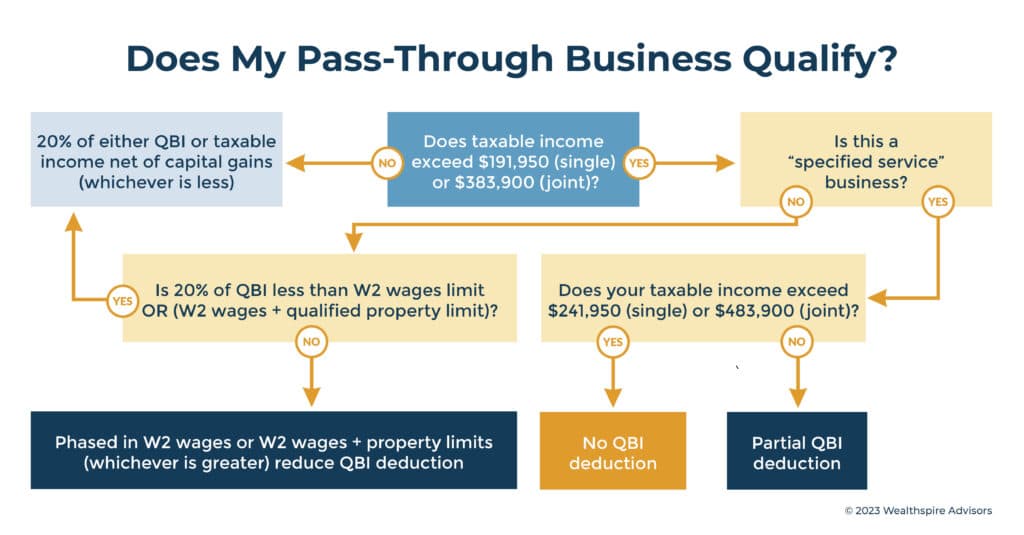The Tax Cuts and Jobs Act of 2017 introduced a 20% tax deduction focused on pass-through businesses. While the deduction has been around for a few years now, many business owners are still wondering whether they will qualify and how to optimize the deduction. While everyone’s circumstances are different, and we encourage consultation with a tax advisor, the Act created an opening for several planning opportunities to potentially reduce tax bills for owners of such businesses.
First, a little background. Qualified business income is a shareholder’s portion of pass-through income. Certain items, such as capital gains, are excluded. Pass-through businesses are those that do not pay tax at the corporate level and “pass-through” the tax onto the owner or owners who report that income on their own individual returns. The structures, including sole proprietorships, partnerships, S Corporations, and limited-liability companies, prevent double taxation at both the corporate and individual level. Specified service businesses, which have special qualification rules for the deduction, are those in which the reputation of a specified individual is a principal asset to the company (more on these in a minute).
As determining whether you qualify for the deduction can be confusing, we’ve created the chart shown here, including details such as phaseouts. And as always, we recommend consulting with a tax accountant for more guidance:
As far as specified service businesses, a bit of bad news for many professionals: Per the IRS, specified service trade or business (SSTB) includes a trade or business involving the performance of services in the field of health, law, accounting, actuarial science, performing arts, consulting, athletics, financial services, investing and investment management, trading, dealing in certain assets or any trade business where the principal asset is the reputation or skill of one or more of its employees. It is important to note that, as we mention in the preceding chart, these sorts of businesses are subject to QBI phaseouts based on taxable income.
The design of this threshold invites planning strategies that may help business owners realize the full benefit of the deduction. These methods use strategic tax deductions, targeted income reduction and generation, and other important tactical items incorporated within an overall financial plan.
Charitable Giving
For those just above the income threshold who are likely to lose most (if not all) of the deduction, making a charitable gift could create significant tax savings. As QBI eligibility is based on taxable income, increasing below-the-line deductions through charitable gifts could potentially lower taxable income enough to qualify for the full deduction. Gifting securities with large long-term imbedded capital gains can add further tax savings. Also, using a donor-advised fund, which allows charitable contributions to be made for an immediate tax benefit and then granted to charity over time, can allow this strategy to be implemented into a client’s long-term charitable legacy.
Consider the example of a family that owns a specified service business structured as an S Corporation. The couple has wage income of $293,900 and lists $300,000 in profits on the K1 statement for the S corporation. Let’s assume their expected Schedule A deductions are $10,000 for state and local tax (SALT) and $100,000 of charitable donations. Their taxable income of $483,900 exceeds the income limit so they will not be eligible for the QBI deduction.
But what if the family were to accelerate their next year of charitable gifts into this year? If the couple makes an additional charitable gift of $100,000 to a donor advised fund, they would reduce their taxable income to below the threshold and be able to collect the full QBI deduction of $60,000 (20% of 300,000).
Retirement Planning
For those who have not already maxed out pre-tax contributions to their IRAs or qualified retirement plans, increasing deferrals could allow taxable income to qualify for the 199a deduction. If the business owner has not yet done so, establishing a profit sharing 401(k) or defined benefit plan can be an effective way to reduce income while supporting their retirement saving goals.
Roth Conversion Strategy
For some, the issue may be ensuring they have enough taxable income to avoid being limited by the overall limit of 20% of taxable income (net of capital gains). If already considering converting from a traditional IRA to a Roth for other financial planning purposes, this strategy could raise taxable income enough to help you realize the full QBI deduction (thus reducing the effective tax rate on the conversion). While this approach may present an opportunity to claim the full deduction, this will need to be weighed against the additional taxes incurred on the conversion.
Avoidance of Capital Gains
Long-term capital gains are generally taxed at a lower rate than ordinary taxable income. It is important to note, however, that capital gains can be detrimental to QBI as they increase taxable income. For a specified service business owner with taxable income directly on the income cusp of qualifying for the deduction, realizing capital gains could be the difference between qualifying for the full QBI deduction and receiving no QBI deduction. For example, assume a joint household has $383,900 of taxable income and then adds $100,000 of capital gains bringing total taxable income to $483,900. Without the capital gains, the household would have been able to take a deduction of up to $76,780 (20% of $383,900); now they must pay capital gains tax on the $100,000 and no longer qualify for the QBI deduction.
While capital gains contribute to taxable income relative to the income thresholds mentioned above, they do not increase taxable income for the 20% of taxable income limit on the deduction. For this reason, the couple in the Roth conversion strategy was not able to accomplish their taxable income needs through realizing capital gains.
Conclusion
The above are just a few examples of the many different strategies that should be considered when navigating this complex tax law. It is important to ensure that a detailed examination is completed with your tax professional and implemented into your overall financial plan accordingly. Every individual situation contains its own unique aspects which may or may not warrant a revised planning strategy. But smart planning can open doors to take advantage of this important new deduction for business owners.





